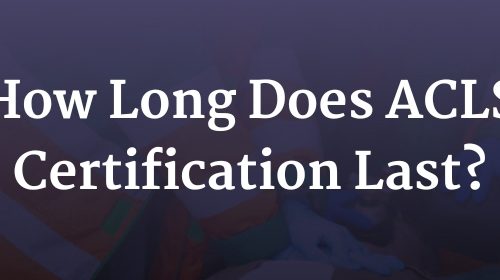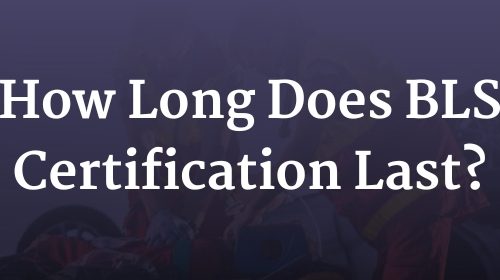What Is ACLS Certification?

Imagine this: a patient in cardiac arrest arrives at the emergency room, and the medical team leaps into action with precision and confidence. Behind this quick and effective response is training in Advanced Cardiovascular Life Support (ACLS). For healthcare professionals, ACLS certification is more than just a requirement—it’s a lifesaving tool that empowers them to handle critical emergencies with expertise.
In this blog, we’ll uncover what ACLS certification is, why it’s essential, and how you can achieve this vital credential.
ACLS Certification: What Is It?
If you’re wondering “What is an ACLS certification?”, you’re not alone. An ACLS certification stands for Advanced Cardiovascular Life Support certification. It is a qualification that healthcare professionals obtain to demonstrate their knowledge and skills in managing life-threatening cardiac emergencies. This certification is typically required for professionals working in emergency medical services, hospitals, and other healthcare settings where they may encounter patients experiencing cardiac arrest, heart attacks, strokes, or other serious heart-related conditions.
What Does ACLS Certification Cover?
ACLS certification helps prepare healthcare professionals to handle medical emergencies with confidence. The ACLS course covers a wide range of topics, including:
- Basic life support (BLS): This includes CPR, use of an AED, and basic airway management.
- Advanced cardiac life support: This covers more advanced techniques such as advanced airway management, medication administration, and defibrillation.
- Recognition and management of cardiac arrest: This includes recognizing the signs and symptoms of cardiac arrest and initiating appropriate interventions.
- Recognition and management of other life-threatening arrhythmias: This includes recognizing and treating other abnormal heart rhythms, such as ventricular tachycardia and ventricular fibrillation.
- Recognition and management of acute coronary syndromes: This includes recognizing and treating heart attacks.
- Recognition and management of stroke: This includes recognizing and treating strokes.
What Is ACLS Certification Used For?
ACLS certification is used to demonstrate a healthcare professional’s ability to manage life-threatening cardiac emergencies. It’s particularly important for those who work in settings where they may encounter patients experiencing:
- Cardiac arrest: This is when the heart stops pumping blood effectively.
- Heart attacks: This occurs when blood flow to the heart is blocked.
- Strokes: This happens when blood flow to the brain is interrupted.
- Other serious heart-related conditions
What Is ACLS Certification for Nurses?
There actually isn’t a specific ACLS certification tailored exclusively for nurses. The ACLS certification is a standardized course designed for a wide range of healthcare professionals, including nurses, physicians, paramedics, and other medical personnel.
The curriculum and skills tested in the ACLS certification are the same regardless of the specific profession of the individual taking the course. This ensures that all healthcare providers are equipped with the necessary knowledge and skills to respond effectively to life-threatening cardiac emergencies.
Who Should Get ACLS Certified?
Healthcare professionals who frequently encounter life-threatening cardiac emergencies should consider getting ACLS certified. This includes:
- Emergency Medical Services (EMS) personnel:
- Paramedics
- Emergency Medical Technicians (EMTs)
- Hospital-based healthcare providers:
- Emergency Department physicians and nurses
- Intensive Care Unit (ICU) physicians and nurses
- Critical Care nurses
- Anesthesiologists
- Respiratory therapists
Essentially, anyone who may be responsible for initiating advanced cardiac life support during a cardiac arrest or other life-threatening arrhythmia should be ACLS certified.
Remember, while ACLS certification is crucial for these professionals, it’s not limited to them. Other healthcare providers, such as physician assistants, nurse practitioners, and dentists, may also benefit from ACLS certification, especially if they work in settings where they may encounter cardiac emergencies.
The decision to pursue ACLS certification often depends on individual job requirements, state regulations, and institutional policies.
What’s The Difference Between BLS and ACLS?
BLS and ACLS are both vital certifications in emergency medical care, but they differ significantly in their scope and complexity. BLS focuses on fundamental life-saving techniques such as CPR and AED use, making it accessible to a wide range of individuals, including laypeople. ACLS, on the other hand, builds upon BLS by providing advanced skills for managing complex cardiac emergencies. It’s designed primarily for healthcare professionals like physicians, nurses, and paramedics, equipping them with techniques like advanced airway management, medication administration, and defibrillation. While BLS provides the initial response to a cardiac arrest, ACLS offers the advanced interventions necessary to improve patient outcomes in critical situations.
How Do You Get ACLS Certified?
To obtain an ACLS certification, you typically need to follow these steps:
- Find an Accredited Course Provider: Look for organizations accredited by recognized bodies like the American Heart Association (AHA) or the American Red Cross. These providers offer both in-person and online courses.
- Complete the Course: The course covers a range of topics, including advanced cardiac life support, recognition and management of cardiac arrest, acute coronary syndromes, and stroke. It often involves a combination of online learning modules and in-person skills sessions.
- Pass the Written Exam: Once you’ve completed the course materials, you’ll need to pass a written exam. This exam assesses your understanding of the theoretical concepts.
- Pass the Skills Test: You’ll also need to demonstrate your practical skills in a hands-on skills session. This typically involves scenarios simulating real-life emergency situations.
- Receive Certification: Upon successful completion of the course, written exam, and skills test, you’ll receive your ACLS certification.
How Long Is ACLS Certification Good For?
ACLS certification is typically valid for two years. After this period, healthcare professionals are required to complete a recertification course to maintain their credentials and ensure their skills remain current with the latest guidelines and protocols. Recertification often involves a review of key concepts, updated techniques, and passing a written and skills-based exam. Staying up to date with ACLS certification is essential for continuing to provide high-quality care in emergency situations.
Get ACLS Training Today
Ready to take your emergency response skills to the next level? ACLS certification not only equips you with the expertise to save lives during critical situations but also ensures you meet industry standards and employer requirements. Whether you’re a nurse, paramedic, or other healthcare professional, earning your ACLS certification is a vital step in advancing your career. With our flexible online ACLS courses, you can train at your own pace while receiving top-quality instruction from accredited providers. Don’t wait—enroll today and gain the confidence and skills needed to make a real difference when it matters most!






Comments